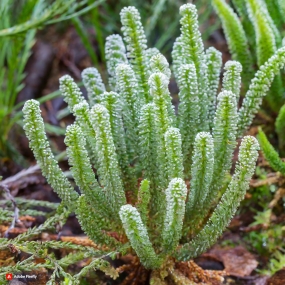Lycopodium clavatum is a species of perennial plant belonging to the Lycopodiaceae family. It is commonly known as "clubmoss" or "hollow-stemmed lycopod". This herbaceous plant grows in dense clumps and generally measures between 15 and 50 cm in height. It has spore-shaped leaves and aerial stems that branch at the top. It is native to Eurasia and North America, but is now widely distributed throughout the world. Hollow-stemmed lycopod is often found in forests, moors and wetlands. It is used in traditional medicine for its medicinal properties and has also been used as a raw material in the paper and fireworks industries.
Origin and history of this plant
Hollow-stemmed lycopod (Lycopodium clavatum) is native to Eurasia and North America. It is widely distributed throughout the world, growing in forests, moors and wetlands.
Hollow-stemmed lycopod has been used in traditional medicine for centuries. It has been used to treat a variety of disorders, including respiratory problems, digestive disorders and nervous disorders. Hollow-stemmed lycopod has also been used as a diuretic and expectorant.
Hollow-stemmed lycopod has also been used as a raw material in the paper and fireworks industries. Due to its high starch content, it has been used as a fuel in fireworks since antiquity.
Hollow-stemmed lycopod is also considered an ornamental plant in some regions, and is cultivated for its spore-shaped leaves and compact growth.
Therapeutic properties
In homeopathy, hollow-stemmed lycopod (Lycopodium clavatum) is used to treat a variety of disorders, including respiratory problems, digestive disorders and nervous disorders. It is often used to treat the following symptoms :
-
Respiratory : dry cough, hacking cough, bronchitis, asthma
-
Digestive : bloating, constipation, indigestion, acid reflux
-
Nervous : anxiety, insomnia, fatigue, mental weakness
Hollow-stemmed lycopod is also used to treat prostate problems and menopausal disorders.
It's important to note that homeopathy uses very dilute doses of substances to treat disorders, and that the medicinal properties of hollow-stemmed lycopod are considered to be largely psychological. As with any medical treatment, it is important to consult a doctor or qualified health professional before taking any homeopathic medicine.
What are the homeopathic indications for Lycopodium clavatum ?
Lycopodium clavatum is a substance used in homeopathy to treat a variety of mental and physical disorders. According to the principles of homeopathy, this substance is believed to help relieve symptoms by acting on the immune system and rebalancing the body.
Here are some common indications for the use of Lycopodium clavatum in homeopathy :
-
Gastrointestinal disorders : bloating, constipation, diarrhea, heartburn
-
Respiratory disorders : dry cough, bronchitis, asthma
-
Mental disorders : anxiety, shyness, insecurity, fear of public speaking
-
Skin disorders : acne, eczema, psoriasis
-
Gynecological disorders : menstrual disorders, menopause
-
Urinary disorders : cystitis, urinary incontinence
How Lycopodium clavatum worsens and improves
In homeopathy, modalities of aggravation and improvement describe the circumstances in which an individual's symptoms may be aggravated or improved. This information can be used to help select the most appropriate homeopathic remedy for a given individual.
Here are some common aggravation and amelioration modalities for lycopodium clavatum :
-
Aggravation : often worse in the evening and at night, after eating, after drinking alcohol, when in closed, warm places
-
Improvement : by being outdoors, exercising, drinking cool water, breathing fresh air.
Homeopathic forms
Lycopodium clavatum is a substance used in homeopathy to treat a variety of mental and physical disorders. It can be administered in a variety of homeopathic forms, including granules, tablets, oral solution and mother tincture.
Here are some examples of common homeopathic forms of lycopodium clavatum :
-
Granules : these small granules are usually taken orally, and can be dissolved in a glass of water or placed under the tongue.
-
Tablets : these are usually taken orally and can be dissolved in a glass of water or placed under the tongue.
-
Oral solution : this form of lycopodium clavatum is generally taken orally and is available in a bottle with a dropper.
-
Mother tincture : this form of lycopodium clavatum is usually taken orally, and is available in a bottle with a dropper.







